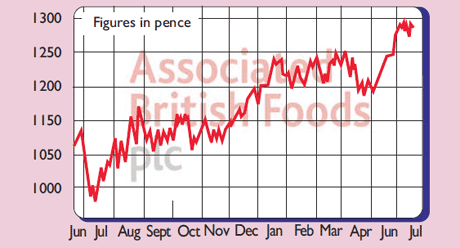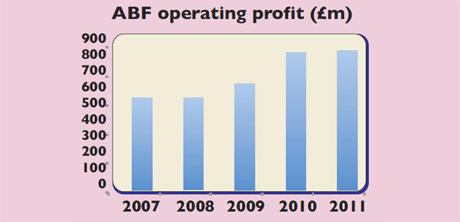Shares in focus: Britain’s food and farming giant
Associated British Foods has some great businesses. But are the shares too pricey? Phil Oakley investigates.
Get the latest financial news, insights and expert analysis from our award-winning MoneyWeek team, to help you understand what really matters when it comes to your finances.
You are now subscribed
Your newsletter sign-up was successful
Want to add more newsletters?

Twice daily
MoneyWeek
Get the latest financial news, insights and expert analysis from our award-winning MoneyWeek team, to help you understand what really matters when it comes to your finances.

Four times a week
Look After My Bills
Sign up to our free money-saving newsletter, filled with the latest news and expert advice to help you find the best tips and deals for managing your bills. Start saving today!
ABF has some great businesses, but the shares are too pricey for us, says Phil Oakley.
The business
Associated British Foods (ABF) has five main businesses. Firstly, it is one of the largest sugar producers in the world. Based in ten countries, it can process five million tonnes of sugar beet and sugar cane a year. The agriculture business sells animal feed to farmers and buys grain from them. Among other things, it also supplies biofuel products.
The third business is Primark, a leading clothing retailer in Britain and Europe. It aims to provide high-quality clothing at "value" prices, mainly to the under-35s. It also has a grocery division, which makes branded products such as Twinings tea, Silver Spoon sugar, Kingsmill bread, Mazola vegetable oil and Ryvita crispbreads. Lastly, it has an ingredients business, which supplies yeast and bakery ingredients to commercial customers.
MoneyWeek
Subscribe to MoneyWeek today and get your first six magazine issues absolutely FREE

Sign up to Money Morning
Don't miss the latest investment and personal finances news, market analysis, plus money-saving tips with our free twice-daily newsletter
Don't miss the latest investment and personal finances news, market analysis, plus money-saving tips with our free twice-daily newsletter
The company had total sales of £11bn in 2011. Wittington Investments Limited, which is part of the Garfield Weston Foundation, owns 54.5% of ABF.
The history
ABF was created in 1935 by Canadian Garfield Weston from seven bakeries. Initially called Food Investments Limited, it soon changed its name to Allied Bakeries. It became a successful and fast-growing food manufacturing business before changing its name again to Associated British Foods Limited in 1960. In 1963, it bought supermarket chain Fine Fare. In 1969, the first Penneys (later to be renamed Primark) store opened in Dublin.
Fine Fare was sold in 1985, while Primark had been growing and picking up stores from other retailers. After trying to buy British Sugar during the late 1980s, ABF finally succeeded in 1991. During the last ten years, ABF has also bought brands such as Ovaltine.
Primark became much bigger in 2005 when it bought the struggling Littlewoods retail business, which came with 120 stores. In recent years Primark has become even more successful as its value fashion products have found favour with cash-strapped consumers. Profits have been good despite high cotton prices. Sugar has also been a key driver of profits due to higher prices and good cost control. Since early 2009, shares in ABF have more than doubled.
The chief executive, George Weston, grandson of the company's founder, Garfield Weston, has been in the post since 2005. Before that he ran ABF's Australian business. He was paid £1.3m in 2011. Mr Weston keeps a low profile, although he is a member of one of the world's richest families. In addition to ABF, the family's retail interests include Fortnum & Mason, Selfridges and Canada's George Weston Limited.
Should you buy the shares?

ABF's profits continue to be driven by British Sugar and Primark. High sugar prices have seen profits surge, but can they stay this high? The EU sugar quota is currently helpful to sugar beet suppliers, but a fall in prices could see profits drop. Primark continues to do well and plans to open more shops. In the tough world of clothing retail, Primark has one of the best business models out there and should keep on growing profits.
ABF's grocery business faces a much tougher time. Competition is intense, with lots of branded goods being heavily discounted in the shops. The Twinings and Ovaltine brands are growing nicely, but trying to make money out of bread is very difficult. ABF's agriculture business is performing well, but is not a big enough part of the business to make a difference.
ABF is a throwback to the old days of conglomerate businesses. The stockmarket used to value them for less than their constituent parts as a way of reflecting their lack of focus. At the current share price, it's difficult to say that that is true of ABF today. The company has some good businesses, but at the moment the shares are too pricey for us. Avoid.

The numbers
Stockmarket code: ABF
Share price: 1,284p
Market cap: £10.1bn
Net assets (Mar 2012): £5.83bn
Net debt (Mar 2012): £1.56bn
P/e (current year estimate): 14.9 times
Yield (prospective): 2.2%
What the analysts say
Buy: 11
Hold: 10
Sell: 1
Average price target: 1,300p
Directors' shareholdings
G Weston: 3,324,369
J Bason: 60,337
E Adamo: 466,234
Get the latest financial news, insights and expert analysis from our award-winning MoneyWeek team, to help you understand what really matters when it comes to your finances.
Phil spent 13 years as an investment analyst for both stockbroking and fund management companies.
-
 New PM Sanae Takaichi has a mandate and a plan to boost Japan's economy
New PM Sanae Takaichi has a mandate and a plan to boost Japan's economyOpinion Markets applauded new prime minister Sanae Takaichi’s victory – and Japan's economy and stockmarket have further to climb, says Merryn Somerset Webb
-
 Plan 2 student loans: a tax on aspiration?
Plan 2 student loans: a tax on aspiration?The Plan 2 student loan system is not only unfair, but introduces perverse incentives that act as a brake on growth and productivity. Change is overdue, says Simon Wilson